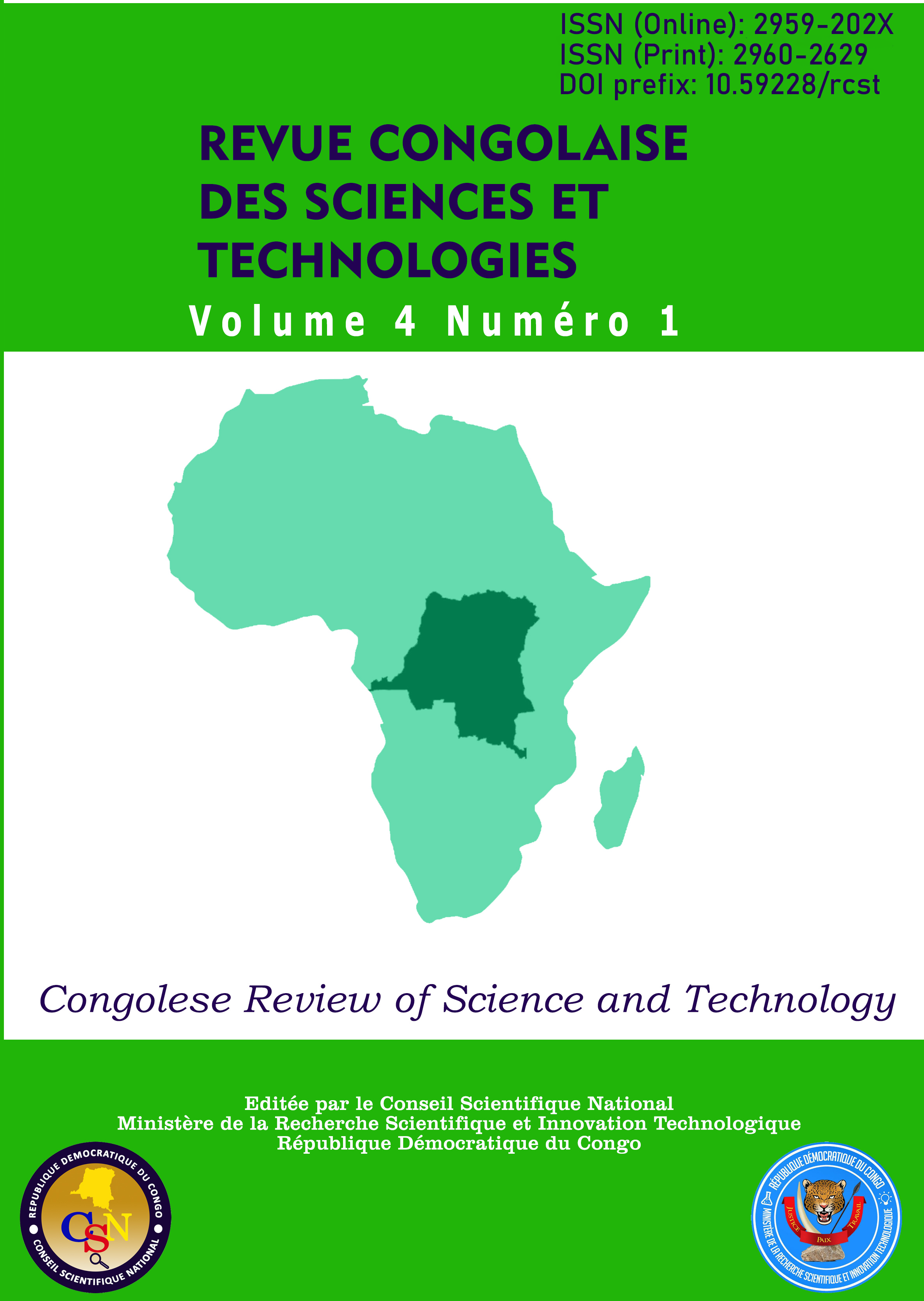Determinants of Immunisation Drop-Out Among Children Aged 6–59 Months in the Urban-Rural Health Zone of Mbandaka, Democratic Republic of the Congo
Main Article Content
Abstract
In developing countries, under-immunisation and high vaccine drop-out rates remain a major concern across all levels of the healthcare system. This study aimed to identify the underlying factors that contribute to the abandonment of vaccination by parents or guardians of children eligible for immunisation. Using a quantitative case-control design, the study compared caregivers of children aged 6 to 59 months who dropped out of the vaccination program (cases) with those whose children followed the vaccination schedule consistently (controls), within a population of 6,152 children in the Mbandaka health zone. Data were collected through structured questionnaires and processed using Excel 2010 and SPSS 2025. The findings revealed that being in the case group was strongly associated with vaccine drop-out (HR=2.53), as well as belonging to a medium-income household (HR=1.84), being in a polyandrous union (HR=2.92), having illiterate parents (HR=6.04), and residing in the central antenna zone (HR=1.93). These results highlight the urgent need for the health zone to reinforce awareness campaigns targeting parents and decision-makers and to enhance vaccine distribution in remote areas to reduce social inequalities in immunisation coverage.
Article Details
Section

This work is licensed under a Creative Commons Attribution-NonCommercial-ShareAlike 4.0 International License.
References
Awadh, A. I., Hassali, M. A., Al-lela, O. Q., Bux, S. H., Elkalmi, R. M., & Hadi, H. (2014). Immunization knowledge and practice among Malaysian parents: A questionnaire development and pilot-testing. BMC Public Health, 14(1), 1107. https://doi.org/10.1186/1471-2458-14-1107.
Bicaba, M. (2005). Profil des inégalités vaccinales au Burkina Faso. Partenariat de recherche Canada-Burkina Faso-Benin-Mali.
Brunner, R., Kaess, M., Parzer, P., Fischer, G., Carli, V., Hoven, C. W., ... & Wasserman, D. (2014). Life‐time prevalence and psychosocial correlates of adolescent direct self‐injurious behavior: A comparative study of findings in 11 European countries. Journal of Child Psychology and Psychiatry, 55(4), 337-348.
Dipela, B. (2023). Les facteurs de la non-complétude du calendrier vaccinal par les mères des enfants de 0 à 15 mois dans la zone de santé de N’djili à Kinshasa/République démocratique du Congo [Thèse de Doctorat, Université Catholique de Louvain]. https://hdl.handle.net/2078.1/thesis:41227.
Fischer, G.-N. (2002). Traité de psychologie de la santé. Dunod.
Fontanet, A. (n.d.). Types d’étude : Études cas-témoins - Analyse.
Kabore, J. (2008). Étude des déterminants du taux d’abandon élevé entre les vaccinations BCG et VAR chez les enfants de 0 à 11 mois dans le district sanitaire de Ouahigouya en 2007 (mémoire de fin d’études, ENSP Ouaga).
Kalemba, L. (2022). Facteurs explicatifs de la faible couverture vaccinale chez les enfants de 0 à 11 mois dans la ZS de Luiza, RD Congo: Risques et perception des mères. International Journal of Social Sciences and Scientific Studies, 1402-1421.
Kashala, S. B., Tshimungu, F., Ngwamah, A. F. B., Dikoma, N., Mawunu, M., Ngbolua, J. P. K. T. N., ... & Omanyondo, M. C. O. (2024). Impact of community health care sites on access to health care for children aged 0 to 5 in the Cilundu and Mukumbi Health Zones, Eastern Kasai, Democratic Republic of the Congo. Orapuh Journal, 5(5), e1146-e1146.
Konan, G. (2003). Perception des mères sur la vaccination de routine dans le district sanitaire de Toumodi en Côte d'Ivoire (mémoire de fin d’études, EPIVAC, IRSP).
Kumanyika, S., Jeffery, R. W., Morabia, A., Ritenbaugh, C., & Antipatis, V. J. (2002). Obesity prevention: the case for action. International journal of obesity, 26(3), 425-436.
Nguefack, F. (2018). Déterminants et raisons de non-vaccination complète des enfants hospitalisés dans deux hôpitaux de référence pédiatrique à Yaoundé. Health Sci. Dis, 19(2), 81-88.
Nguenga Kamani, N. L. (2020). Facteurs associés à la non-observance du calendrier vaccinal des enfants de 0 à 11 mois dans le district de santé de Djoungolo – Cameroun. Health Sci. Dis, 21(2), 111-117.
Sunguliya, M. M., Kimba, P. M., Mashinda, D. K., Nkamba, D. M., Tawi, J. M., & Nyandwe, J. K. (2024). Facteurs associés à la non-vaccination des enfants âgés de 12-23 mois dans la Zone de santé de Kilela Balanda, dans la Province du Haut-Katanga. Revue de l’Infirmier Congolais, 8(1), 1-7. https://doi.org/10.62126/zqrx.2024811.
Vannice, K. S., Salmon, D. A., Shui, I., Omer, S. B., Kissner, J. & Edwards, K. M. (2011). Attitudes and beliefs of parents concerned about vaccines: Impact of timing of immunization information. Pediatrics, 127(Supplement 1), S120-S126.
WHO. (2023). Vaccines et vaccination. https://www.who.int/fr/health-topics/vaccines-and-immunization#tab=tab_1.
WHO. (2024). Vaccination et coverage. https://www.who.int/fr/news-room/fact-sheets/detail/immunization-coverage.
Whyte, M. D., Whyte, J., Cormier, E., & Eccles, D. W. (2011). Factors influencing parental decision making when parents choose to deviate from the standard pediatric immunization schedule. J Community Health Nurs, 28(4), 204-214.

